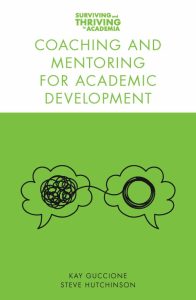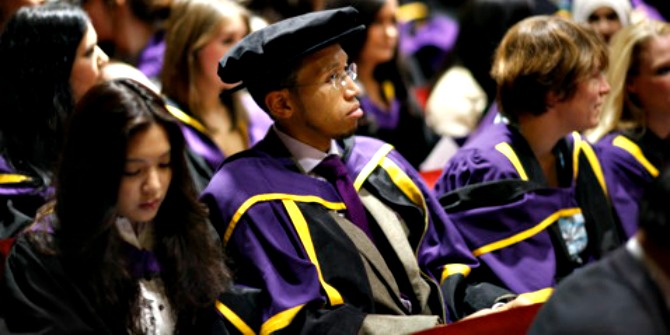In Coaching and Mentoring for Academic Development, Kay Guccione and Steve Hutchinson make the case for mentoring and coaching as key to building a learning culture in higher education, exploring how coaching and mentoring programmes can be embedded to provide learning opportunities as well as support and growth for academic and research staff. Jo Collins welcomes this invaluable and timely book for offering tools, clarity and a framework for those supporting mentoring programmes to develop practice and experiment.
Coaching and Mentoring for Academic Development. Kay Guccione and Steve Hutchinson. Emerald Publishing. 2021.
 Find this book (affiliate link):
Find this book (affiliate link):![]()
Kay Guccione and Steve Hutchinson’s Coaching and Mentoring for Academic Development stakes a claim for mentoring and coaching as key to building a learning culture in higher education. This is vital, the authors point out, as academics and researchers experience persistent precarity. Researchers, many of whom are on fixed term contracts at the start of their career (21), are buffeted by ‘macropolitical and economic factors’ (18), expected to over-perform (24) and to move institutions (21), all of which variously disrupt autonomy, progression and potentially work-life stability. Furthermore, with the onset of the COVID-19 pandemic, the informal learning opportunities that arise from impromptu conversations in corridors, kitchens and so forth are no longer happening. This is a very timely book, because it asserts that coaching and mentoring programmes should and can be embedded in higher education to provide learning opportunities as well as support and growth for academic and research staff, precisely when these staff are most at risk of becoming atomised.
The authors assert that this hope for a learning culture within higher education avoids a ‘deficit approach’ to mentorship. They reject the notion that coaching and mentoring should be introduced merely to solve problems (32), or with the aim of addressing ‘weaknesses’ of those being mentored (13). This deficit model of mentoring and coaching sits alongside an engrained narrative within academia that ‘if you need training, you are failing’ (32), highlighting a suspicion of programmes of skills and development perceived to be bureaucratic and antithetical to research (95). Contrary to this, the authors assert an ethos of coaching and mentoring that empowers the mentee, leading to self-reliance and authentic development rather than instructed solutions (33).
These educational aims and ethos are developed throughout the book, which is brimming with useful tools on topics such as difficult conversations, coaching through change and coaching for efficacy, mentoring agreements and evaluating programmes. The book is structured neatly, and is an easy read the whole way through or for dipping in and out of sections. The initial section explores where to start with mentoring and how to understand the context of higher education; a second section illustrates practices, concepts and tools; and a third section directs readers towards enhancing the value and reputation of mentoring at programme level. Here the authors give the tools to develop a learning culture, and also to embed it institutionally.
Within their educational aim, the authors also seek to reframe the perception that mentoring is ‘giving advice’, moving instead towards a coaching approach which centres on the mentee’s experiences. Indeed, this might seem somewhat contradictory in a book which advocates mentors building ‘repertoires of practice beyond advice’ (34), whilst itself seemingly giving advice. Yet, Guccione and Hutchinson carefully and steadily tread the fine line between offering advice and encouraging the reader to explore further, to reflect on their own personal and institutional situations and to customise the resources offered for their specific needs.

At the outset, Guccione and Hutchinson state their inspiration for this book was to support staff in universities who are working on or developing mentoring and coaching schemes, to help them ‘work through the planning and development of a good mentoring offer [and] place […] coaching conversations at the heart of practice’ (8). For me this book was invaluable in working through how to frame and provide resources around mentoring as a great coaching conversation for my own mentoring scheme. The pithy chapters cut right through to the essential questions and considerations at the heart of planning mentoring programmes, and a range of different factors are explored including careers, writing, leadership and mentoring through change.
The authors argue convincingly that coaching and mentoring must take into account the specific qualities of the higher education environment, including what they describe as the ‘structural flatness’ of hierarchy in academia (21). Mentors in higher education need to ‘understand the context and challenges of the environment (as opposed to a professional coach who can simply ask the ‘‘right’’ questions)’. Rather than simply dispensing advice, an effective mentor in higher education leads with ‘a coaching style’ (13).
With this well-defined position, the book is an interesting contrast to Jill Andreanoff’s Coaching and Mentoring in Higher Education (2016), which expansively defines both coaching and mentoring as non-directive, whilst identifying mentoring as a longer process than coaching (6). Andreanoff’s book has a broader focus on students, and undergraduates mentoring school pupils, whilst Guccione and Hutchinson home in on academics and researchers (including PhD students). Andreanoff looks at practical elements, such as the number of hours to set aside for a programme compared to the numbers of mentees, and includes a range of case studies. If Andreanoff’s book might be characterised as process-orientated, Guccione and Hutchinson push further ‘politically’, as they make a case for developing institutional codes of practice around mentoring (and include an example), as part of their agenda to see coaching and mentoring embedded in higher education institutions.
One thing I found useful for my own practice was the authors’ notion that universities are likely to be bisected into ‘cultural pockets’ dependent on subject area, leadership and geography (21) rather than having a uniting organisation culture. As such, they contend, ‘development professionals can find that what works well in one pocket might not in another’ (21). This was particularly valuable as a consideration in operating a mentoring scheme. Indeed, I thought this notion could be threaded back into the chapters that go into detail on matching mentoring pairs and reasons why matches may not work, specifically around how prospective mentees could be nudged beyond those cultural pockets. Academics tend to gravitate towards their scholarly community to formulate a sense of identity, and work more effectively when they feel they belong to it (for example, Kirsi Pyhältö and Jenni Keskinen, 2012). As such, participants may wish to be matched to others in their own ‘cultural pocket’. However, working in meaningful developmental conversations with those from other scholarly communities could potentially facilitate shifts in thinking. This is particularly important as a significant proportion of PhD students (Pyhältö and Keskinen, 2012; J. Stubb et al, 2011) and academic staff (Gloria Guidetti et al, 2020) can find their scholarly community burdening.
In summary, this is a book that I and – I am certain – other staff developers have long been hoping for. It provides tools, clarity and a framework for those supporting mentoring programmes to develop practice and experiment. Throughout, the authors are realistic about the likelihood of wrangles in establishing mentoring’s credibility and achieving institutional traction. Their focus on developing a strategic institutional approach around mentoring is indispensable. I can imagine future editions of this book or related resources featuring case studies of how readers developed mentoring schemes and sought to embed mentoring within their own institutions. My hope is that the included work from the Sheffield Mentoring Network functions like a call to arms, empowering those cloistered in their own universities to seek greater institutional entrenchment of mentoring and coaching.
Note: This review gives the views of the author, and not the position of the LSE Review of Books blog, or of the London School of Economics. The LSE RB blog may receive a small commission if you choose to make a purchase through the above Amazon affiliate link. This is entirely independent of the coverage of the book on LSE Review of Books.
Banner Image Credit: Image by chenspec from Pixabay.
Feature Image Credit: Image by Tumisu from Pixabay.








2 Comments